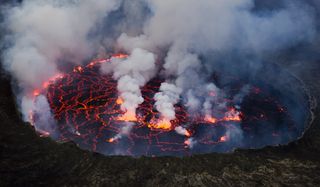
Would You Really Sink If You Fell into a Volcano?

It's the horrific fate of many movie characters: Upon falling into a pit of lava, they rapidly sink, liquidating in the 2,000-degree-Fahrenheit (1,000-degree-Celsius) molten rock.
When contemplating the death of one such character, Gollum, who dives into a bubbling volcano in the book and film "Lord of the Rings: Return of the King," geoscientist and blogger Erik Klemetti had a startling revelation. As he wrote in a recent blog post at Wired Science, "Everyone is wrong about how people die when they fall into lava."
Falling into lava is not like falling into a lake, Klemetti explained; a person would float on top of it rather than becoming submerged. "Molten lava is nothing like water. Sure, everyone thinks that liquid rock (magma) is going to behave like any other liquid (e.g., water), but there are some key physical properties that tell us it just isn't the case," he wrote. [The Surprisingly Strange Physics of Water ]
First, lava is more than three times denser than water; because humans are made mostly of water, it's three times denser than us, too. The laws of physics therefore dictate that we will float on its surface, not sink. Secondly, lava's viscosity its resistance to flow is between 100,000 and 1.1 million times higher than that of water. That means a pit of lava is about as fluid as a jar of peanut butter or a vat of Crisco.
For both those reasons, "it is going to be next to impossible to sink into that liquid," Klemetti wrote.
All this is not to say that you'll be spared a gruesome end if you fall into a volcano. Buoyed on a bed of molten rock four times hotter than the broiler in an oven, you'll quickly burst into flames and burn to death.
Follow Natalie Wolchover on Twitter @nattyover. Follow Life's Little Mysteries on Twitter @llmysteries, then join us on Facebook.
Sign up for the Live Science daily newsletter now
Get the world’s most fascinating discoveries delivered straight to your inbox.
Natalie Wolchover was a staff writer for Live Science from 2010 to 2012 and is currently a senior physics writer and editor for Quanta Magazine. She holds a bachelor's degree in physics from Tufts University and has studied physics at the University of California, Berkeley. Along with the staff of Quanta, Wolchover won the 2022 Pulitzer Prize for explanatory writing for her work on the building of the James Webb Space Telescope. Her work has also appeared in the The Best American Science and Nature Writing and The Best Writing on Mathematics, Nature, The New Yorker and Popular Science. She was the 2016 winner of the Evert Clark/Seth Payne Award, an annual prize for young science journalists, as well as the winner of the 2017 Science Communication Award for the American Institute of Physics.

